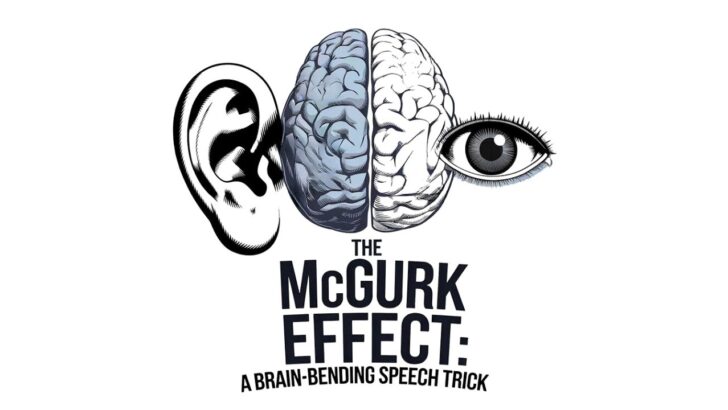Picture this: you’re watching someone speak in a video. Their lips are clearly mouthing “ba, ba, ba,” but what you hear is “da, da, da.” Confused? Don’t worry—you’re not losing your mind! What you’re experiencing is the McGurk Effect, a fascinating brain glitch where what you see clashes with what you hear, and your brain scrambles to fill in the blanks with something completely different.
Think of it as a playful tug-of-war between your eyes and ears—a little prank your senses play on each other! And believe it or not, this fascinating phenomenon isn’t just fun to experience; it’s also packed with insights about how we perceive language. Curious about how this strange effect works and what it can teach us about learning languages? Let’s break it down and see why sometimes, hearing isn’t believing!
What Exactly is Happening in the McGurk Effect?
The McGurk Effect occurs when the visual information from seeing someone’s lip movements doesn’t match the auditory information of what they are saying. Your brain, in its endless quest to make sense of things, tries to reconcile this mismatch. Instead of choosing one sense over the other, it blends them, leading you to perceive a completely new sound—one that wasn’t actually said! It’s like a linguistic cocktail mixed up by your brain.
For instance, if a video shows someone’s lips forming the word “ga,” but the audio plays the word “ba,” your brain might meet in the middle and make you hear “da.” This phenomenon happens because our brains are wired to fuse both auditory and visual cues when interpreting speech, especially when what we see and hear conflict.
Why Does the McGurk Effect Matter for Language Learners?
The McGurk Effect isn’t just a neat party trick; it has some serious implications for anyone learning a new language.
Here’s why:
Seeing is Hearing (Kind of):
When learning a language, it’s not just about listening to sounds or memorizing vocabulary; it’s also about observing how native speakers form those sounds with their mouths. Your brain is more likely to correctly interpret a new sound if it can link the audio to a corresponding visual cue. Watching the lip movements of speakers helps reinforce the connection between sound and meaning, making it easier to learn and remember new words or phrases.
Navigating Miscommunication in the Real World
The McGurk Effect can give us insights into real-world scenarios where our senses might mislead us. In noisy environments, poor video quality calls, or situations where someone’s face is partially obscured (think masks!), our brains might create misunderstandings by merging the mismatched signals. Awareness of this can help language learners stay patient and ask for clarification when something sounds off—literally!
A Fun Tool for Pronunciation Practice
Want to sound more like a native speaker? Pay close attention to how they move their mouths when they speak. The McGurk Effect shows us that language isn’t just an auditory experience—it’s visual too. By focusing on both listening and watching, you can improve your pronunciation and mimic the mouth shapes and movements of native speakers.
Boosting Your Listening Skills
Understanding that our brains can sometimes “hear” things differently based on what we see can make us more aware of our listening habits. Are you truly hearing the sounds of a new language correctly, or is your brain playing tricks on you? Knowing this can help you fine-tune your listening skills and be more mindful of how you perceive sounds.
How to Experience the McGurk Effect Yourself
Curious to see the McGurk Effect in action? We’re going to take a look at a fantastic video from the BBC on YouTube that perfectly demonstrates this mind-bending phenomenon. In the video, you’ll watch as a person’s lips say one thing, the audio says another, and your brain decides to meet them halfway with a completely different sound. It’s a great way to experience firsthand how our senses can clash and collaborate in surprising ways!
Check out the video, and be prepared to have your perception of speech challenged in the most fascinating way possible. After watching, you’ll never hear—or see—language quite the same way again!

Hey fellow Linguaholics! It’s me, Marcel. I am the proud owner of linguaholic.com. Languages have always been my passion and I have studied Linguistics, Computational Linguistics and Sinology at the University of Zurich. It is my utmost pleasure to share with all of you guys what I know about languages and linguistics in general.

